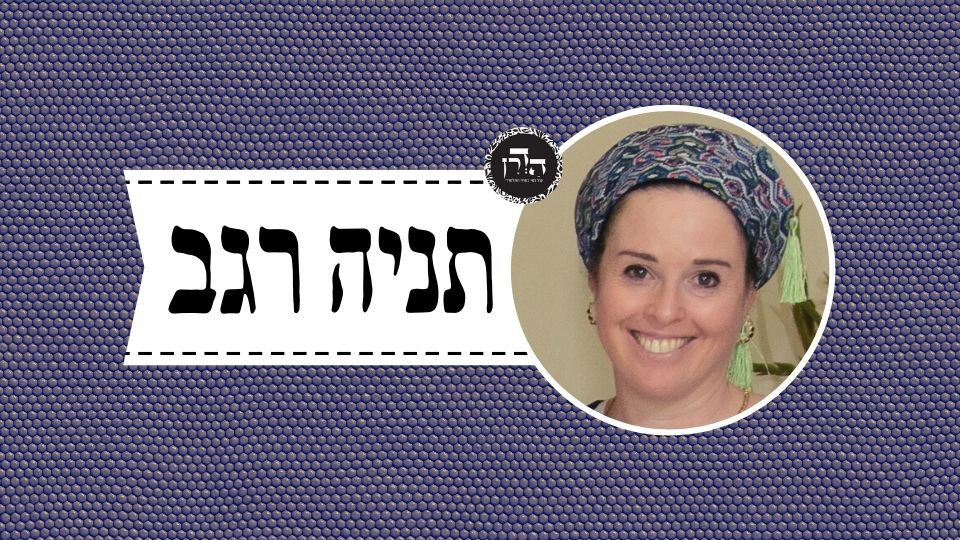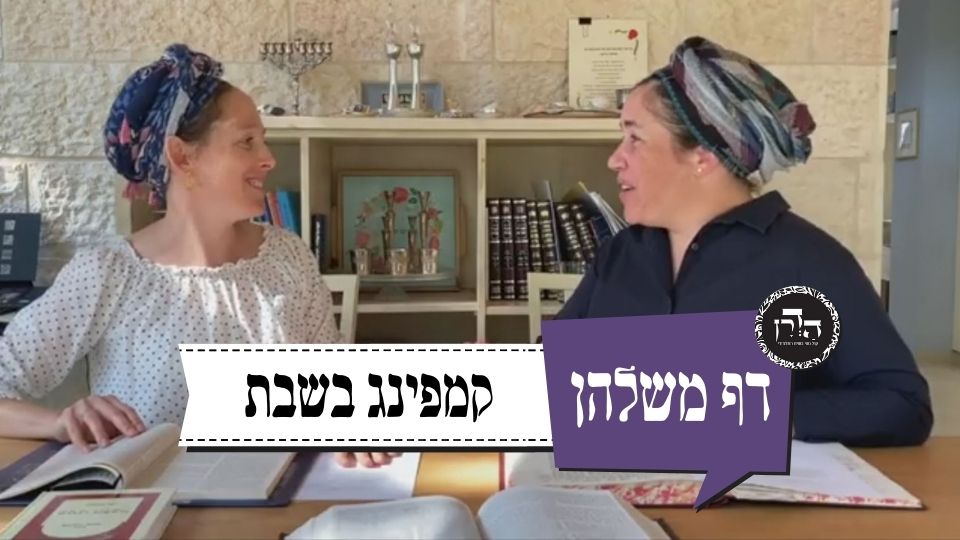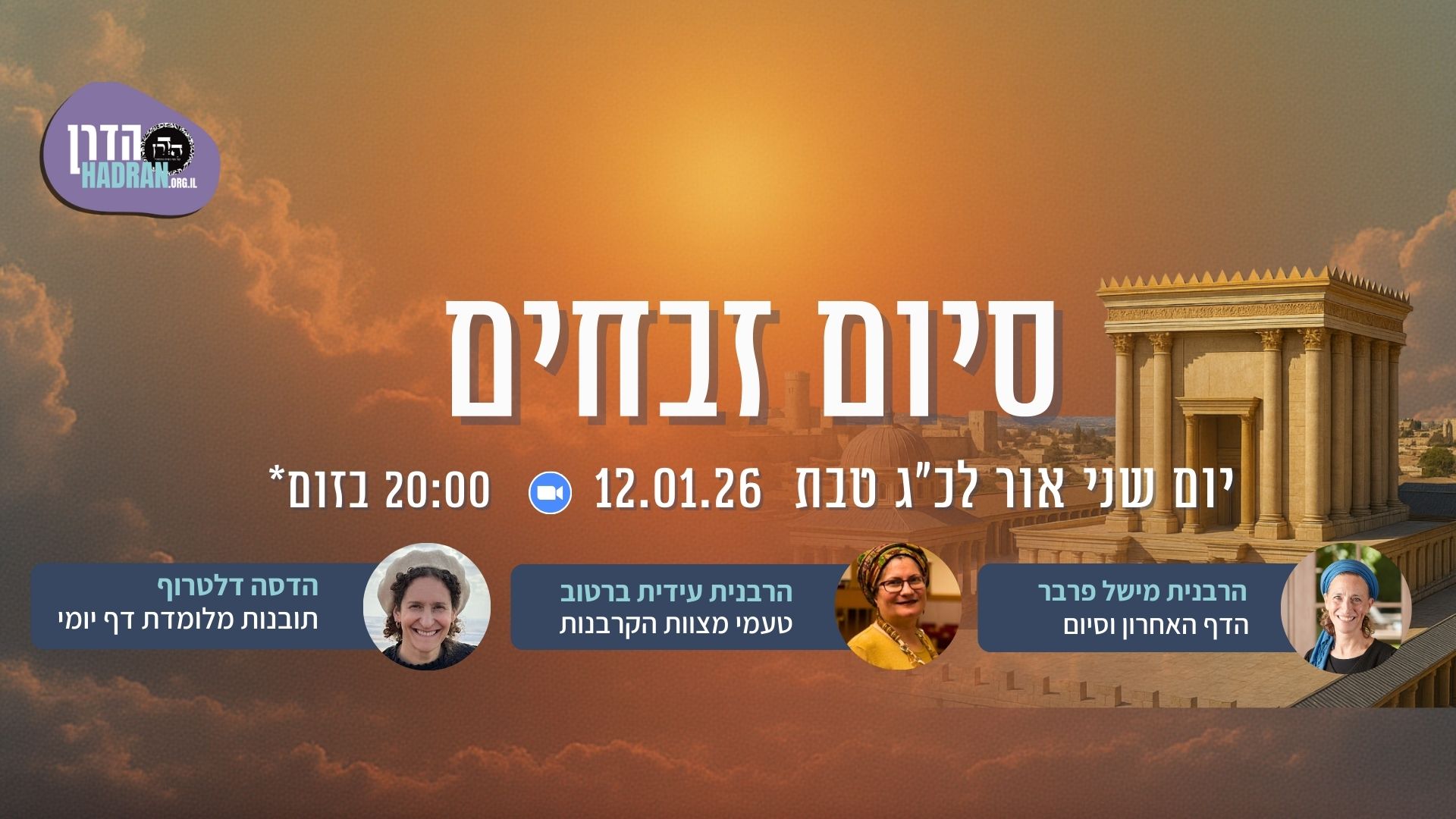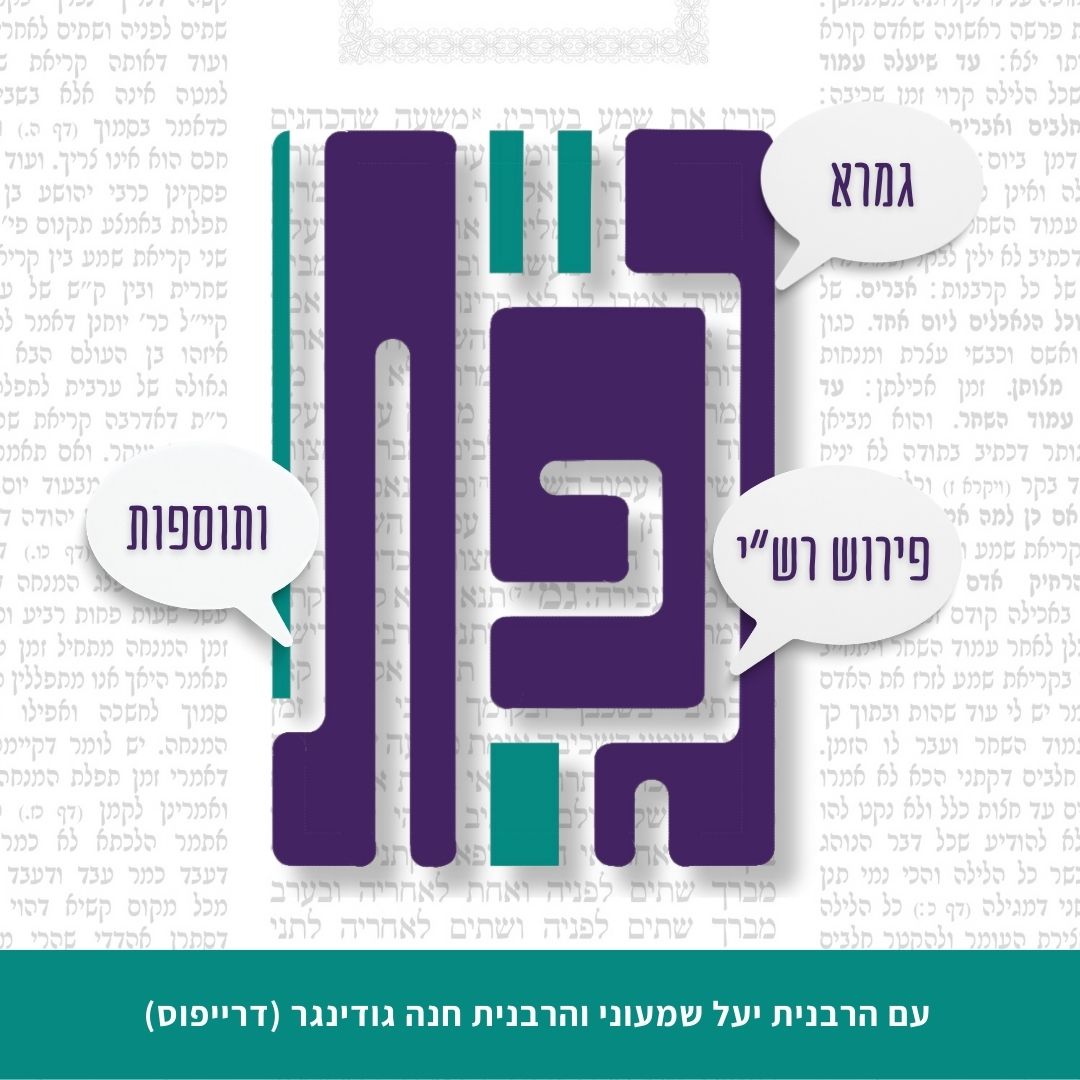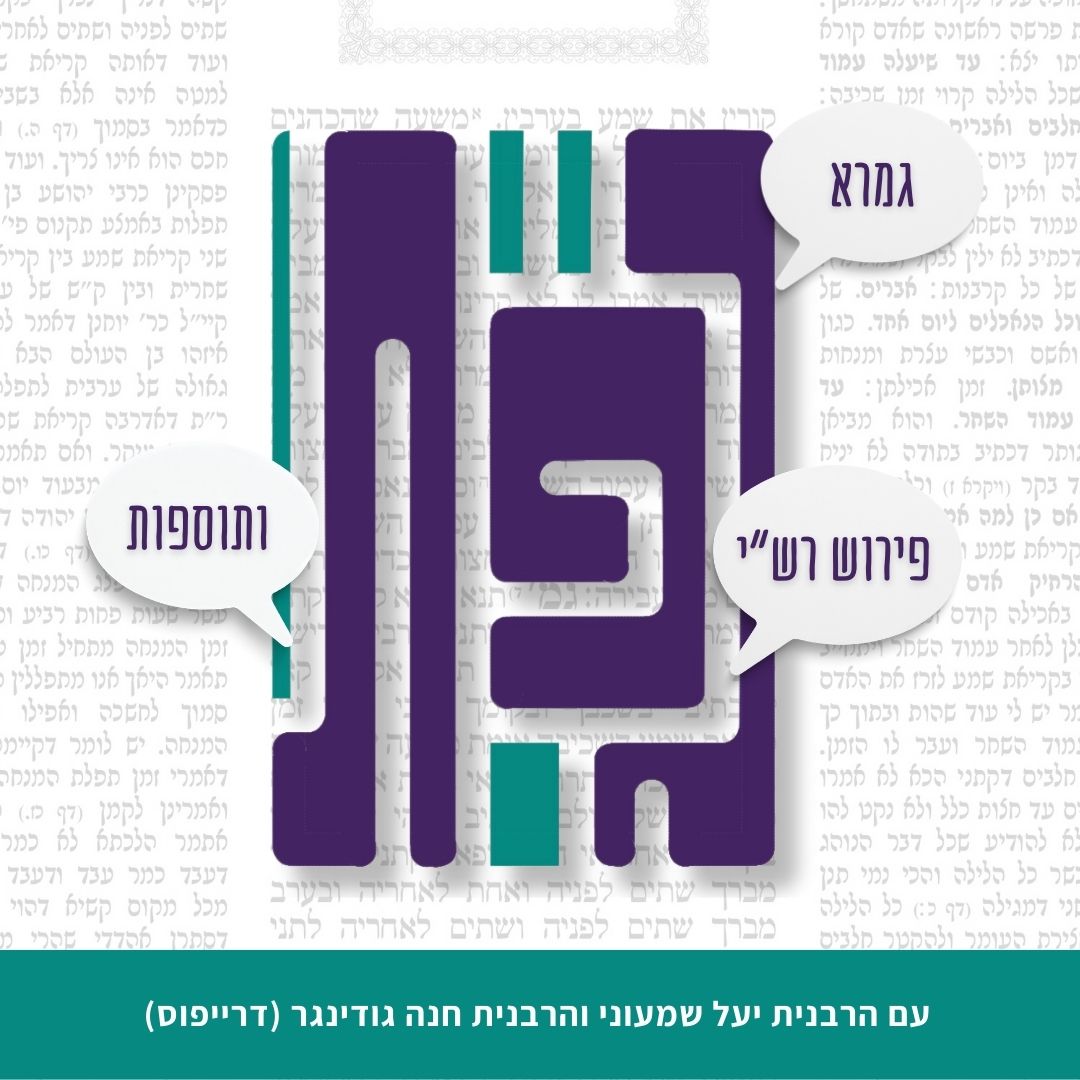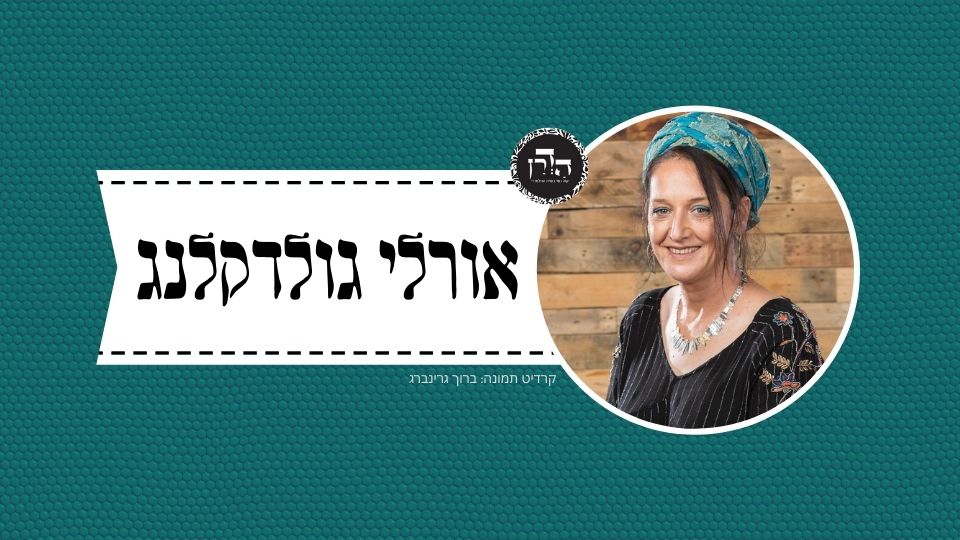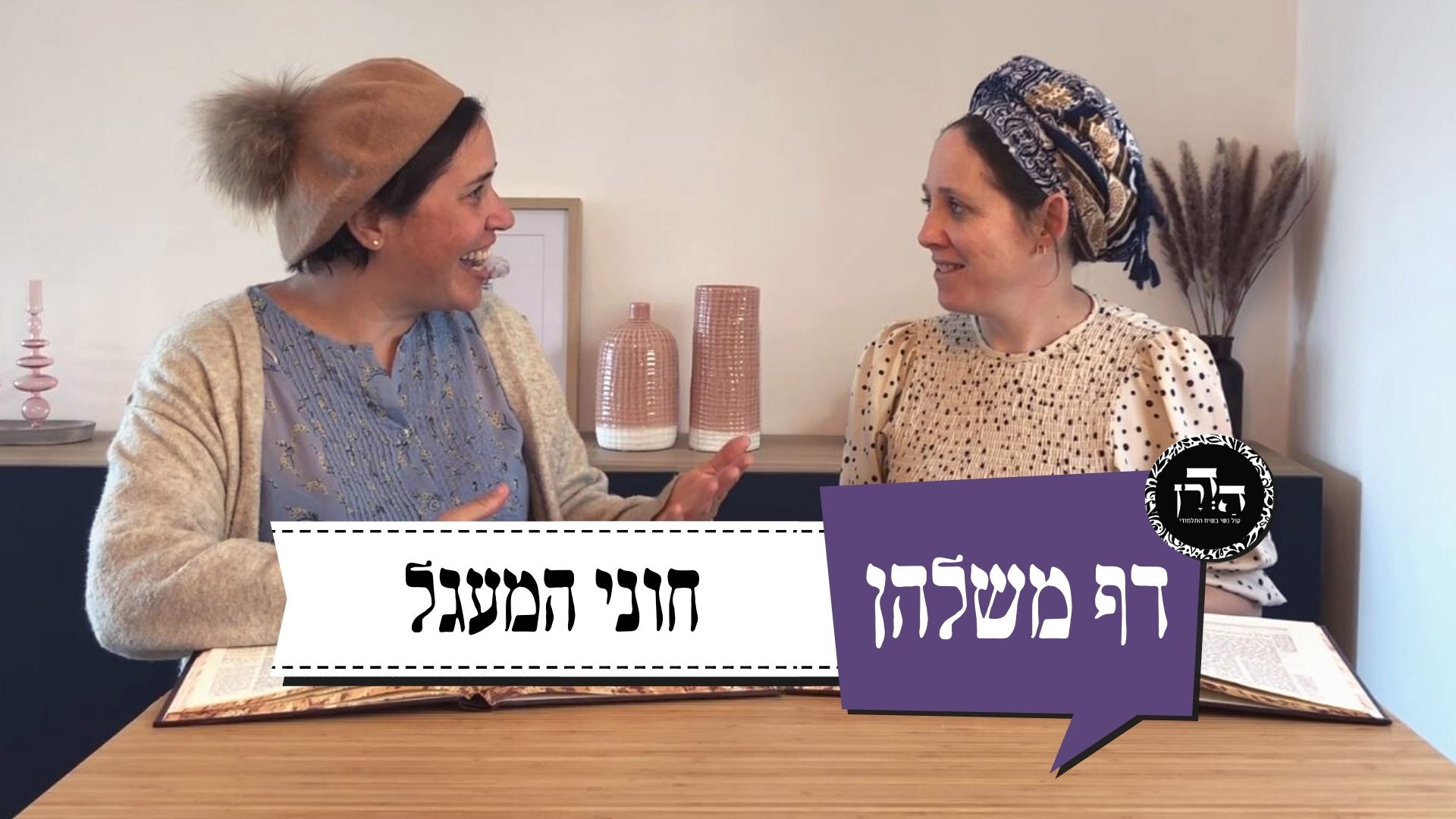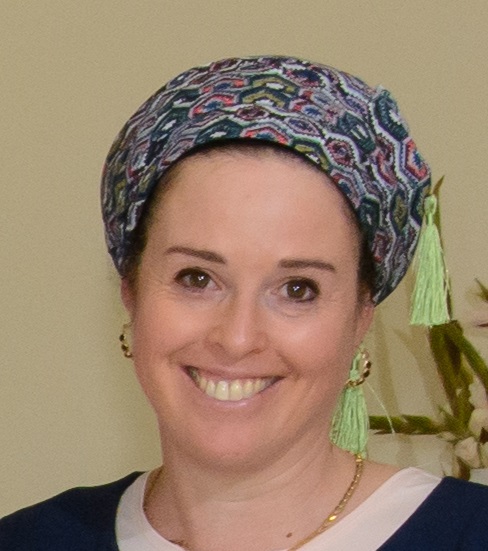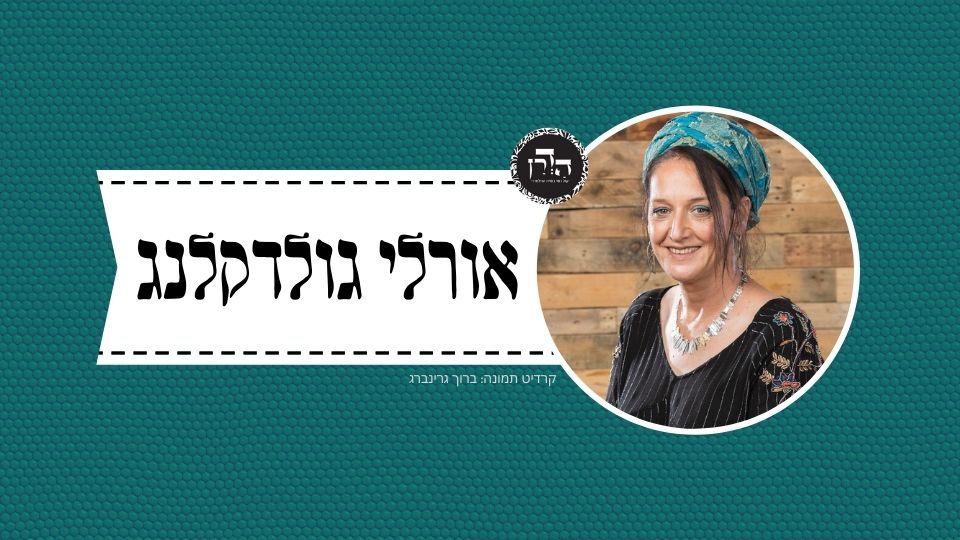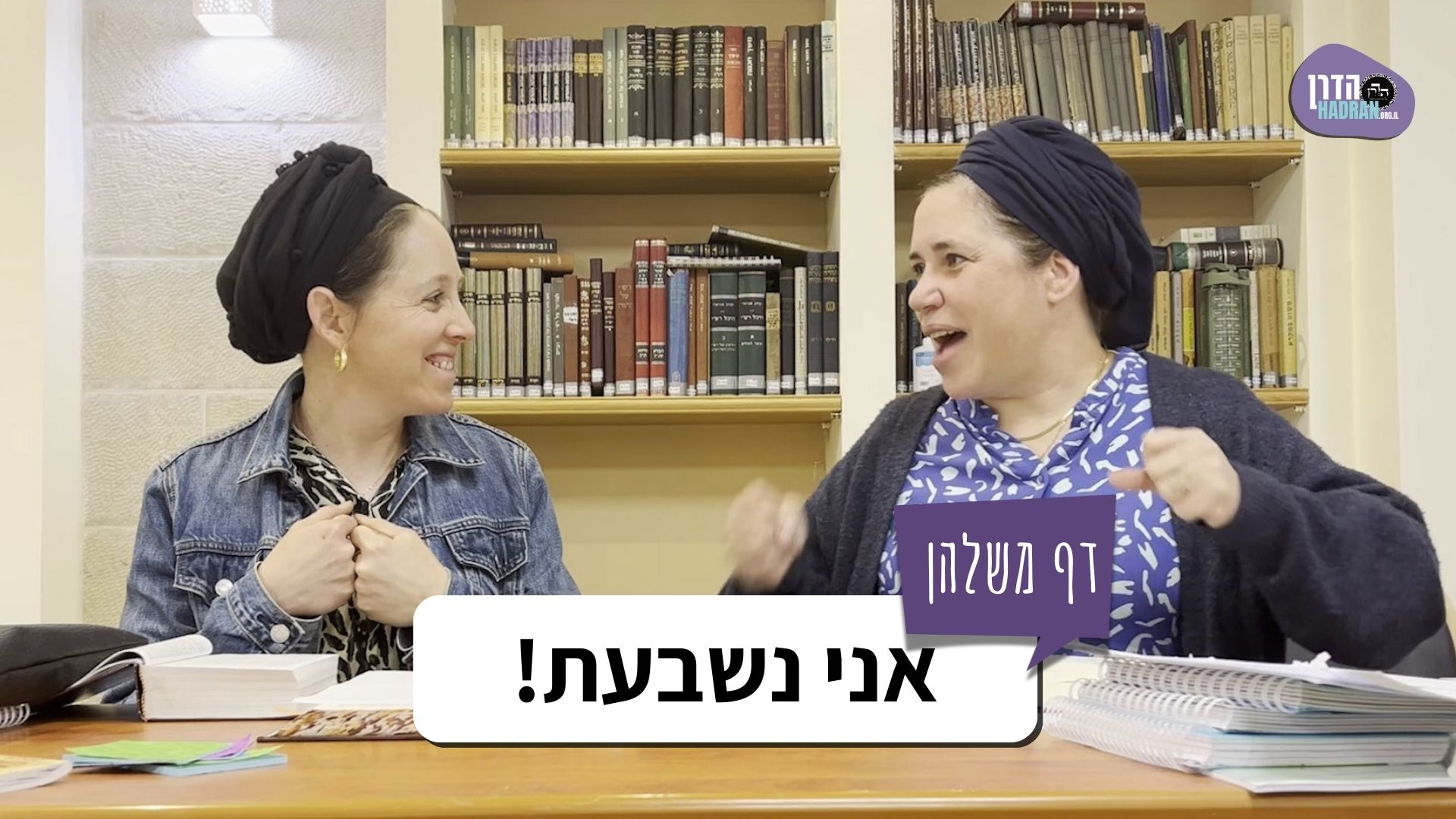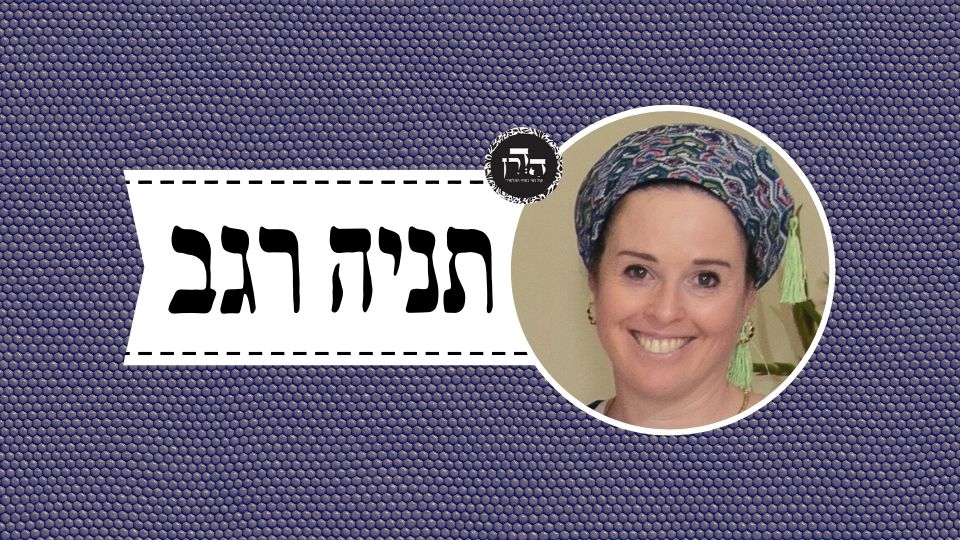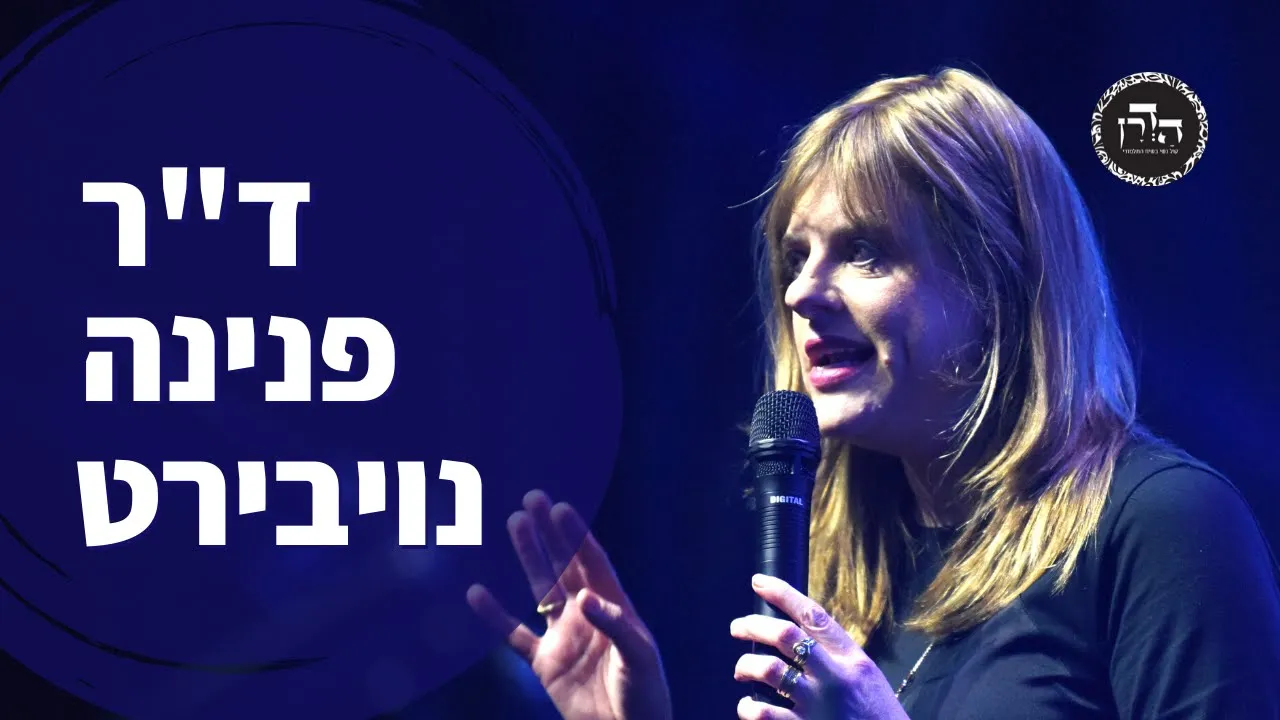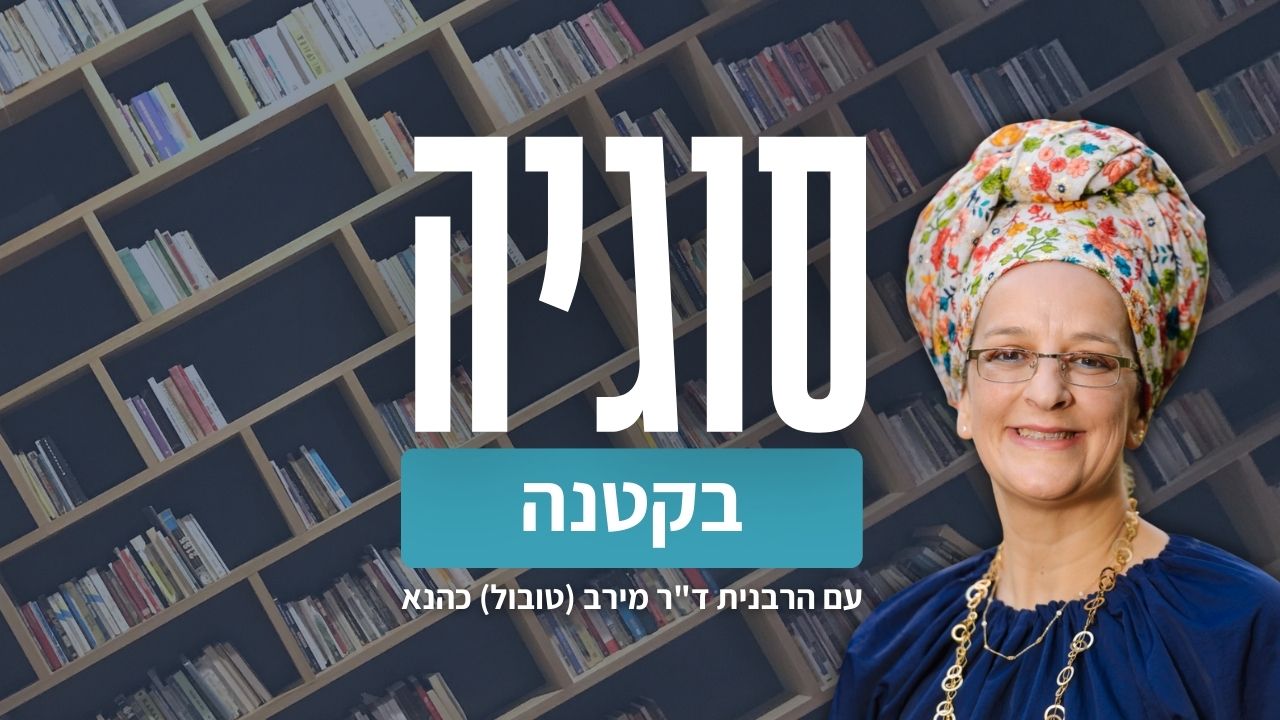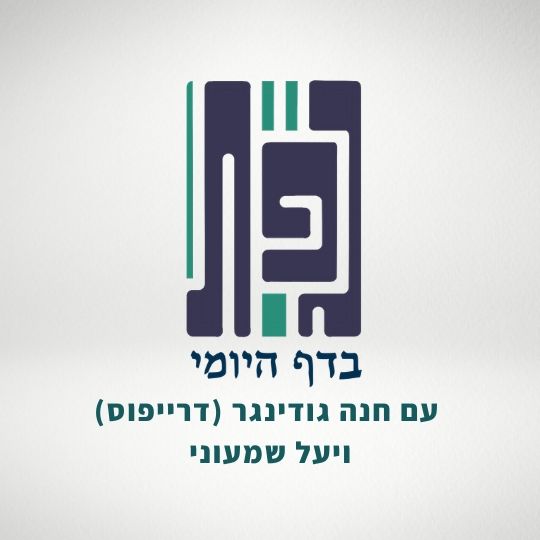איזה קנסות מטילים על מי שמטיל מום בבהמתו? איך זה דומה למקרים אחרים שקונסים?
הלימוד השבוע מוקדש לזכות ולשלום הַיְימׇנוֹט אֱמוּנָה בַּת באנצ’י (קָסָאוּ) בת 11 שנעלמה במקום מגוריה בצפת, לפני שנתיים, ביום ט”ז אדר תשפ”ד (25.2.24), ולא נודעו עקבותיה.
הלימוד השבוע מוקדש למען ביטחון המדינה, החיילים והאזרחים, ולמען חירותו של העם האיראני. שנזכה בקרוב שיתקיים בנו הפסוק: "לַיְּהוּדִים הָיְתָה אוֹרָה וְשִׂמְחָה וְשָׂשֹׂן וִיקָר”.
הלימוד השבוע מוקדש לזכות וְלִשְׁלוֹם הָיימָנוֹט אֱמוּנָה בַּת באנצ’י (קָסָאוּ), בת 11 שנעלמה במקום מגוריה בצפת, לפני שנתיים, ביום ט”ז אדר תשפ״ד (25.2.24), ולא נודעו עקבותיה. אנו מתפללים שֶׁתִּמָּצֵא וְתוּשַׁב לביתה במהרה!
רוצה להקדיש שיעור?

כלים
הלימוד השבוע מוקדש לזכות ולשלום הַיְימׇנוֹט אֱמוּנָה בַּת באנצ’י (קָסָאוּ) בת 11 שנעלמה במקום מגוריה בצפת, לפני שנתיים, ביום ט”ז אדר תשפ”ד (25.2.24), ולא נודעו עקבותיה.
הלימוד השבוע מוקדש למען ביטחון המדינה, החיילים והאזרחים, ולמען חירותו של העם האיראני. שנזכה בקרוב שיתקיים בנו הפסוק: "לַיְּהוּדִים הָיְתָה אוֹרָה וְשִׂמְחָה וְשָׂשֹׂן וִיקָר”.
הלימוד השבוע מוקדש לזכות וְלִשְׁלוֹם הָיימָנוֹט אֱמוּנָה בַּת באנצ’י (קָסָאוּ), בת 11 שנעלמה במקום מגוריה בצפת, לפני שנתיים, ביום ט”ז אדר תשפ״ד (25.2.24), ולא נודעו עקבותיה. אנו מתפללים שֶׁתִּמָּצֵא וְתוּשַׁב לביתה במהרה!
כלים
העמקה
רוצה להבין מה באמת קורה מתחת לפני השטח של הסוגיה?
שיעורים, פודקאסטים והרחבות של מיטב המורות שלנו יפתחו לך עוד זוויות וכיווני חשיבה.
חדשה בלימוד הגמרא?
זה הדף הראשון שלך? איזו התרגשות עצומה! יש לנו בדיוק את התכנים והכלים שיעזרו לך לעשות את הצעדים הראשונים ללמידה בקצב וברמה שלך, כך תוכלי להרגיש בנוח גם בתוך הסוגיות המורכבות ומאתגרות.
פסיפס הלומדות שלנו
גלי את קהילת הלומדות שלנו, מגוון נשים, רקעים וסיפורים. כולן חלק מתנועה ומסע מרגש ועוצמתי.
בכורות לד
אֶלָּא שֶׁלֹּא יִתֵּן בּוֹ מוּם, מִנַּיִן שֶׁלֹּא יָבִיא דְּבֵילָה וּבָצֵק וְיַנִּיחֶנָּה עַל הָאוֹזֶן כְּדֵי שֶׁיָּבֹא כֶּלֶב וְיֹאכְלֶנָּה? תַּלְמוּד לוֹמַר ״כׇּל מוּם״ — אֶחָד מוּם וְאֶחָד כׇּל מוּם.
only the prohibition that one may not directly cause a blemish. From where is it derived that one may not bring pressed figs or dough and place it on the animal’s ear so that a dog will come and eat it, thereby biting off part of the animal’s ear and leaving it blemished? The verse states: “There shall not be any blemish in it” (Leviticus 22:21), indicating that the same prohibition applies both when the blemish is caused directly and when it is any blemish, even one caused indirectly.
הָכָא בִּקְרָאֵי פְּלִיגִי, דְּאָמַר רַב יְהוּדָה אָמַר שְׁמוּאֵל, וְכֵן אָמַר רֵישׁ לָקִישׁ, וְכֵן אָמַר רַב נַחְמָן אָמַר רַבָּה בַּר אֲבוּהּ: ״וַאֲנִי הִנֵּה נָתַתִּי לְךָ אֶת מִשְׁמֶרֶת תְּרוּמֹתָי״.
After demonstrating that the tanna’im in the baraita discussing the firstborn offering disagree with regard to the exposition of certain verses, the Gemara clarifies that the tanna’im here, in the baraita discussing teruma whose status concerning impurity is uncertain, also disagree with regard to the exposition of verses. As Rav Yehuda says that Shmuel says, and Reish Lakish likewise says, and Rav Naḥman likewise says that Rabba bar Avuh says: It is stated in a verse addressed to Aaron and his sons: “And I, behold, I have given you the charge of My terumot [terumotai]” (Numbers 18:8), with “terumotai” written in plural.
רַבִּי אֱלִיעֶזֶר סָבַר: בִּשְׁתֵּי תְּרוּמוֹת הַכָּתוּב מְדַבֵּר, אַחַת תְּרוּמָה טְהוֹרָה וְאַחַת תְּרוּמָה תְּלוּיָה, וְאָמַר רַחֲמָנָא: עֲבֵיד לַהּ שִׁימּוּר. וְרַבִּי יְהוֹשֻׁעַ: ״תְּרוּמָתִי״ כְּתִיב.
Rabbi Eliezer, who holds that the barrel of teruma must be safeguarded from ritual impurity, holds that the verse is speaking of two terumot: Both teruma that is definitely ritually pure and teruma that is in abeyance, i.e., teruma whose status with regard to impurity is uncertain. And based on the plural “My terumot,” it is understood that the Merciful One states: Make a protection for it, i.e., safeguard even teruma whose status concerning impurity is uncertain. And Rabbi Yehoshua, who holds that one may expose to ritual impurity the teruma contents in the barrel, holds that the term terumotai is written so that it can be read as terumati, meaning: My teruma, in the singular. Therefore, the requirement to safeguard teruma applies only to that teruma whose status is definitely pure.
לְמֵימְרָא דְּרַבִּי אֱלִיעֶזֶר סָבַר יֵשׁ אֵם לַמִּקְרָא? וּרְמִינְהִי: ״בְּבִגְדוֹ בָּהּ״ — כֵּיוָן שֶׁפֵּירַשׂ טַלִּיתוֹ עָלֶיהָ, שׁוּב אֵינוֹ רַשַּׁאי לְמוֹכְרָהּ, דִּבְרֵי רַבִּי עֲקִיבָא.
The Gemara asks: Is this to say that Rabbi Eliezer holds that the vocalization of the Torah is authoritative, i.e., one derives halakhot based on the pronunciation of the words, although it diverges from the spelling? And the Gemara raises a contradiction from a baraita discussing a Hebrew maidservant’s return to her father’s house. The verse states, with regard to her master: “He shall have no power to sell her to a foreign people, seeing that he has dealt deceitfully with her [bevigdo bah]” (Exodus 21:8). The term “bevigdo” shares a root with a word for garment, beged. Therefore, the verse indicates that once the master has spread his garment over her, thereby designating her as his wife, if the maidservant is subsequently divorced or widowed, her father may no longer sell her. This is the statement of Rabbi Akiva, who maintains that the vocalization of the Torah is authoritative, and he interprets bevigdo as related to bigdo, his garment.
רַבִּי אֱלִיעֶזֶר אוֹמֵר: כֵּיוָן שֶׁבָּגַד בָּהּ, שׁוּב אֵינוֹ רַשַּׁאי לְמוֹכְרָהּ!
Rabbi Eliezer says: The word bevigdo is written without a yod and therefore is written in a manner that it can be read: Bevagdo. Accordingly, bevigdo bah means that since the father dealt deceitfully [bagad] with her by selling her once, he may not sell her again. Evidently, Rabbi Eliezer maintains that the manner in which the verses in the Torah are written is authoritative, and one derives halakhot based on the spelling of the words. This contradicts his derivation with regard to teruma, which is based on the pronunciation of the words.
אֶלָּא, הָכָא בְּהָא קָמִיפַּלְגִי: רַבִּי יְהוֹשֻׁעַ סָבַר: הָרְאוּיָה לָךְ שְׁמוֹר, וְשֶׁאֵינָהּ רְאוּיָה לָךְ לָא תִּשְׁמוֹר, וְרַבִּי אֱלִיעֶזֶר: הָא נָמֵי רְאוּיָה הִיא, שֶׁמָּא יָבוֹא אֵלִיָּהוּ וִיטַהֲרֶנָּה.
Rather, here, the tanna’im disagree with regard to this: The verse states: “And I, behold, I have given you the charge of My terumot” (Numbers 18:8). Rabbi Yehoshua holds that the term “you” teaches that only teruma that is fit for you to eat, i.e., teruma that is definitely ritually pure, you must safeguard. But teruma that is not fit for you, i.e., teruma whose status with regard to impurity is uncertain, you do not need to safeguard. And Rabbi Eliezer holds that this teruma, whose status with regard to impurity is uncertain, is also considered fit for you, because perhaps Elijah will come and deem it ritually pure.
אָמַר רַב יְהוּדָה אָמַר שְׁמוּאֵל: הֲלָכָה כְּרַבִּי שִׁמְעוֹן. מַתְקֵיף לַהּ רַב נַחְמָן בַּר יִצְחָק: הֵי רַבִּי שִׁמְעוֹן? אִילֵימָא רַבִּי שִׁמְעוֹן דְּמַתְנִיתִין, עַד הַשְׁתָּא לָא אַשְׁמְעִינַן שְׁמוּאֵל דָּבָר שֶׁאֵין מִתְכַּוֵּין מוּתָּר?
§ The Gemara again discusses letting the blood of a firstborn offering. Rav Yehuda says that Shmuel says: The halakha is in accordance with the opinion of Rabbi Shimon. Rav Naḥman bar Yitzḥak objects to this: To which opinion of Rabbi Shimon is Shmuel referring? If we say he is referring to the opinion of Rabbi Shimon in the mishna, that the blood may be let despite the resulting blemish, because the purpose of the treatment is solely medical, that cannot be correct. After all, hasn’t Shmuel taught us until now that an unintentional act, i.e., a permitted action from which a prohibited result inadvertently ensues, is permitted?
וְהָא רַבִּי חִיָּיא בַּר אָשֵׁי אָמַר רַב: הֲלָכָה כְּרַבִּי יְהוּדָה, וְרַב חָנִין בַּר אָשֵׁי אָמַר שְׁמוּאֵל: הֲלָכָה כְּרַבִּי שִׁמְעוֹן, וְרַב חִיָּיא בַּר אָבִין מַתְנֵי בְּלָא גַּבְרֵי — רַב אָמַר: הֲלָכָה כְּרַבִּי יְהוּדָה, וּשְׁמוּאֵל אָמַר: הֲלָכָה כְּרַבִּי שִׁמְעוֹן!
But doesn’t Rav Ḥiyya bar Ashi say that Rav says: The halakha is in accordance with the opinion of Rabbi Yehuda, who maintains that an unintentional act is prohibited, and Rav Ḥanin bar Ashi says that Shmuel says: The halakha is in accordance with the opinion of Rabbi Shimon, that an unintentional act is permitted. And Rav Ḥiyya bar Avin teaches these rulings directly, without citing additional men in their transmission. He simply states that Rav says that the halakha is in accordance with the opinion of Rabbi Yehuda, and Shmuel says that the halakha is in accordance with the opinion of Rabbi Shimon. Evidently, Shmuel could not be referring to the opinion of Rabbi Shimon in the mishna, as if so, he would be repeating himself.
אֶלָּא רַבִּי שִׁמְעוֹן דְּבָרַיְיתָא, וְרַב שִׁישָׁא בְּרֵיהּ דְּרַב אִידִי מַתְנֵי לַהּ בְּהֶדְיָא: אָמַר רַב יְהוּדָה אָמַר שְׁמוּאֵל: הֲלָכָה כְּרַבִּי שִׁמְעוֹן דְּבָרַיְיתָא.
The Gemara answers: Rather, Shmuel is referring to the opinion of Rabbi Shimon in the baraita (33b), that not only may one let the blood of the dying firstborn animal despite the resulting blemish, but it is even permitted to eat the animal’s meat on account of the blemish. And the Gemara notes that Rav Sheisha, son of Rav Idi, teaches this explicitly: Rav Yehuda says that Shmuel says: The halakha is in accordance with the opinion of Rabbi Shimon as stated in the baraita.
מַתְנִי׳ הַצּוֹרֵם אוֹזֶן בַּבְּכוֹר — הֲרֵי זֶה לֹא יִשְׁחוֹט עוֹלָמִית, דִּבְרֵי רַבִּי אֱלִיעֶזֶר. וַחֲכָמִים אוֹמְרִים: נוֹלַד בּוֹ מוּם אַחֵר — יִשְׁחוֹט עָלָיו.
MISHNA: In the case of one who slits [hatzorem] the ear of a firstborn offering, that person may never slaughter that animal. This is the statement of Rabbi Eliezer. And the Rabbis say: If another blemish later develops in the firstborn, he may slaughter the animal on account of that second blemish.
גְּמָ׳ וּמִי קָנֵיס רַבִּי אֱלִיעֶזֶר לְעוֹלָם? וּרְמִינְהִי: מִי שֶׁהָיְתָה לוֹ בַּהֶרֶת
GEMARA: The Gemara asks: But does Rabbi Eliezer penalize for a transgression forever? And the Gemara raises a contradiction from a mishna (Nega’im 7:5): In the case of one who had a snow-white leprous mark [baheret] on his body,
וְנִקְצְצָה — טָהוֹר, קְצָצָה מִתְכַּוֵּין — רַבִּי אֱלִיעֶזֶר אוֹמֵר: לִכְשֶׁיִּוָּלֵד לוֹ נֶגַע אַחֵר יִטְהַר הֵימֶנּוּ.
and it inadvertently got excised, that individual is ritually pure. If he excised it intentionally, in an attempt to render himself ritually pure, the Sages impose a punitive impurity upon him. The tanna’im disagree with regard to the extent of the penalty: Rabbi Eliezer says: When he will develop another leprous mark, his status of ritual purity is assessed based on this new mark. When that mark is ruled ritually pure, he will become ritually pure from the ritual impurity generated by the mark he excised.
וַחֲכָמִים אוֹמְרִים: עַד שֶׁתִּפְרַח בְּכוּלּוֹ, אוֹ עַד שֶׁתִּמְעַט בַּהַרְתּוֹ מִכִּגְרִיס!
And the Rabbis say: The development of a new leprous mark is insufficient. Rather, he must wait either until the leprosy of the new mark spreads over his entire body, a sign of ritual purity (see Leviticus 13:12), or unless his old baheret had shrunk to a size smaller than that of a split beanbefore he excised it. Otherwise, he remains ritually impure. In any event, it is clear from this mishna that Rabbi Eliezer does not impose an indefinite penalty on one who transgresses. If so, why does he impose an indefinite penalty in the mishna discussing one who causes a blemish on the ear of a firstborn offering?
רַבָּה וְרַב יוֹסֵף דְּאָמְרִי תַּרְוַויְיהוּ: כִּי קָנֵיס רַבִּי אֱלִיעֶזֶר בְּמָמוֹנוֹ, בְּגוּפוֹ לָא קָנֵיס.
Rabba and Rav Yosef both say, in answer to this question, that when Rabbi Eliezer penalizes one who transgresses, that is only in a case which involves his property, e.g., a firstborn offering. But in a case which affects his body, e.g., leprosy, he does not penalize him to such an extent.
מָמוֹנוֹ — אִיכָּא לְמֵימַר דְּאָתֵי לְמֶיעְבַּד, גּוּפוֹ — מִי אִיכָּא לְמֵימַר דְּאָתֵי לְמֶיעְבַּד?
The Gemara elaborates: With regard to his property, i.e., the firstborn offering, if he would not be penalized indefinitely, there is reason to say that he might come to perform an action which would cause a blemish. Since the firstborn offering is anyway prohibited for personal use until it is blemished, he suffers no risk in blemishing it. A greater deterrent than usual is therefore needed to prevent such action. By contrast, in the case of leprosy on his body, is there a basis to say that he will come to perform an action and remove the white spot? In this case, the limited penalty of having to wait for purification from another leprous mark serves as a sufficient deterrent, as there is no guarantee that another mark will ever appear.
אָמַר רָבָא: דְּרַבִּי אֱלִיעֶזֶר אַדְּרַבִּי אֱלִיעֶזֶר קַשְׁיָא, דְּרַבָּנַן אַדְּרַבָּנַן לָא קַשְׁיָא?
Rava said: Is this to say that the statement of Rabbi Eliezer in the mishna here is difficult in light of the other statement of Rabbi Eliezer in the mishna in Nega’im, whereas the statement of the Rabbis in the mishna is not difficult in light of the other statement of the Rabbis in Nega’im? In the mishna here, the Rabbis impose a limited penalty on the transgressor, whereas in the mishna in Nega’im they impose an indefinite one. This contradiction also requires resolution.
אֶלָּא, דְּרַבִּי אֱלִיעֶזֶר אַדְּרַבִּי אֱלִיעֶזֶר לָא קַשְׁיָא, כִּדְשַׁנִּינַן. רַבָּנַן אַדְּרַבָּנַן נָמֵי לָא קַשְׁיָא, הָכָא בְּמַאי דַּעֲבַד קַנְסוּהּ, הָכָא בְּמַאי דַּעֲבַד קַנְסוּהּ.
Rather, say: The statement of Rabbi Eliezer in the mishna here is not difficult in light of the statement of Rabbi Eliezer in Nega’im, as we answered. Likewise, the statement of the Rabbis in the mishna is not difficult in light of the statement of the Rabbis in Nega’im, as both rulings follow the same logic. Here, the Rabbis penalized him for what he did, and there, the Rabbis penalized him for what he did.
בְּמַאי אִיכַּוֵּין לְמִישְׁרְיֵיהּ בְּהַאי מוּמָא? בְּהַאי מוּמָא קַנְסוּהּ רַבָּנַן, דִּבְהַאי מוּמָא לָא לִישְׁתְּרֵי לֵיהּ. וְהָכָא, בְּמַאי דַּעֲבַד קַנְסוּהּ — אִיכַּוֵּין לְטַהוֹרֵי נַפְשֵׁיהּ בְּהַאי קְצִיצָה, בְּהַאי קְצִיצָה קַנְסוּהּ רַבָּנַן.
The Gemara elaborates: In the case of causing a blemish in a firstborn offering, by what means did he intend to permit it? By means of this blemish. Therefore, the Rabbis penalized him only with regard to this blemish, i.e., that the animal will not become permitted to him by means of this blemish that he himself caused. The firstborn offering retains its status as unblemished and will become permitted only if it develops another blemish. And similarly, here, with regard to the removal of the leprous mark, the Rabbis penalize him for what he did. He intended to render himself ritually pure by means of this act of excising the mark. Therefore, the Rabbis penalized him with regard to this act of excision. It is considered as though he did not excise the mark, and as a result, he remains impure permanently.
בָּעֵי רַב פָּפָּא: ״יִטְהַר״ תְּנַן, אוֹ ״וְיִטְהָר״ תְּנַן?
§ The Gemara analyzes Rabbi Eliezer’s statement: When he will develop another leprous mark, he will become ritually pure [yit’har] from the first. Rav Pappa asks: What is the correct version of Rabbi Eliezer’s statement? Did we learn: Yit’har, or did we learn: Veyit’har, and he will become ritually pure? Yit’har indicates that he will immediately be rendered ritually pure from the first leprous mark upon the appearance of the second mark. Veyit’har, by contrast, indicates that the punitive ritual impurity by rabbinic law imparted by the first mark remains until the second mark is deemed ritually pure.
לְמַאי נָפְקָא מִינַּהּ? לְחָתָן שֶׁנִּרְאָה בּוֹ נֶגַע.
The Gemara asks: What is the practical difference between the two versions? After all, he is in any case ritually impure due to the second mark until that mark is deemed pure. The Gemara explains that there is a difference in the case of a bridegroom who had removed a leprous mark upon whom a new leprous mark appeared during the seven days of his wedding celebrations.
דִּתְנַן: חָתָן שֶׁנִּרְאָה בּוֹ נֶגַע — נוֹתְנִין לוֹ שִׁבְעָה יָמִים, לוֹ וּלְאִצְטְלִיתוֹ וְלִכְסוּתוֹ, וְכֵן בָּרֶגֶל — נוֹתְנִין לוֹ כׇּל יְמֵי הָרֶגֶל.
As we learned in a mishna (Nega’im 3:2): In the case of a bridegroom upon whom a leprous mark appeared, the court grants him seven days of his wedding celebrations before the mark is examined by a priest. This grace period is granted to him whether the mark appeared on him, i.e., his body, or on his cloak, or on any other garment of his. And similarly, with regard to any individual upon whom a leprous mark appeared during a pilgrimage Festival, the court grants him all the days of the pilgrimage Festival as a grace period, during which the mark is not examined by a priest.
אִי אָמְרַתְּ ״יִטְהַר״ תְּנַן — מִקַּמַּיְיתָא טְהַר לֵיהּ, לְבָתְרָיְיתָא נָטְרִין לֵיהּ שִׁבְעָה יְמֵי מִשְׁתֶּה.
The Gemara continues: If you say that we learned that the correct reading of Rabbi Eliezer’s statement is yit’har, i.e., the individual is rendered ritually pure upon the development of the new mark, this means that he is ritually pure during the seven-day period, as he has already become ritually pure of the punitive impurity from the first mark. As for the latter mark, we wait the seven days of feasting for him, before the mark is examined by a priest. He is therefore ritually pure in all regards.
אֶלָּא אִי אָמְרַתְּ: ״וְיִטְהַר״ תְּנַן — סוֹף סוֹף, כִּי לָא מְטַמֵּית לְבָתְרָיְיתָא, הָא מִיטַּמֵּא וְקָאֵי מִקַּמַּיְיתָא. מַאי? תֵּיקוּ.
But if you say that we learned that the correct reading of Rabbi Eliezer’s statement is veyit’har, and the punitive impurity of the first mark remains intact until the ritual purity of the second mark has been confirmed, the grace period has no effect. The reason is that ultimately, even if the individual does not yet contract ritual impurity from the latter mark, he remains ritually impure on account of the first mark until the purification of the latter mark. The Gemara asks: What is the resolution to Rav Pappa’s query? Since there is no clear resolution, the Gemara concludes that the dilemma shall stand unresolved.
בָּעֵי מִינֵּיהּ רַבִּי יִרְמְיָה מֵרַבִּי זֵירָא: צוֹרֵם אוֹזֶן בַּבְּכוֹר וָמֵת, מַהוּ לִקְנוֹס בְּנוֹ אַחֲרָיו?
§ The mishna teaches that one who slits the ear of a firstborn offering is prohibited indefinitely from slaughtering the animal on account of that blemish. Rabbi Yirmeya raises a dilemma before Rabbi Zeira: In the case of one who slits the ear of a firstborn offering and subsequently dies, what is the halakha with regard to penalizing his son after the father’s death? Does the penalty prohibiting consumption of the firstborn offering extend to the son?
אִם תִּימְצֵי לוֹמַר: מוֹכֵר עַבְדּוֹ לַגּוֹיִם וָמֵת — קָנְסוּ בְּנוֹ אַחֲרָיו, דְּכֹל יוֹמָא וְיוֹמָא מַפְקַע לֵיהּ מִמִּצְוֹת.
The Gemara compares this dilemma to two similar cases. If you say the halakha should be derived from the case of one who sells his Canaanite slave to gentiles and the seller subsequently dies, where the Sages penalized his son after the father’s death and required him to redeem the slave, this is not a direct parallel. The Gemara explains: It is possible that the penalty is extended to the son only there, as each day that the slave is in the servitude of the gentile master, that master prevents the slave from performing mitzvot. A Canaanite slave is obligated to perform the same mitzvot as a Jewish woman, and he is unable to fulfill the mitzvot when in the possession of a gentile. Since this reason does not apply in a case of a firstborn offering, the case of the Canaanite slave cannot be cited as a source to resolve this dilemma.
אִם תִּימְצֵי לוֹמַר: כִּוֵּון מְלַאכְתּוֹ בַּמּוֹעֵד וָמֵת — לֹא קָנְסוּ בְּנוֹ אַחֲרָיו, מִשּׁוּם דְּלָא עַבְדֵהּ לְאִיסּוּרָא.
And if you say the halakha should be derived from the case of one who planned from the outset to perform his labor on the intermediate days of a Festival, by placing himself in a situation in which the labor should in theory be permitted, i.e., that a significant monetary loss would otherwise be incurred, that comparison is also inaccurate. The Gemara elaborates: In such a case the Sages penalized him by deeming it prohibited for him to perform the labor and by removing his rights to any of the finished products, but if he died before the start of the Festival, they did not penalize his son after the father’s death. This case is not a direct parallel either, as it is possible that it is only there that the penalty is not extended to the son, since the father did not yet perform a prohibited act, as he did not carry out any action on the Festival before he died.
הָכָא מַאי? לְדִידֵיהּ קְנַסוּ רַבָּנַן, וְהָא לֵיתֵיהּ, אוֹ דִלְמָא לְמָמוֹנֵיהּ קְנַסוּ רַבָּנַן, וְהָא אִיתֵיהּ?
If so, here, in the case of mutilating the ear of a firstborn offering, what is the halakha? Should one say that the Sages penalized only him, i.e., the father, and he is no longer alive? Or perhaps the Sages imposed the penalty upon his property, i.e., that no benefit may be derived from the animal, and that animal still exists in the possession of his heirs.
אֲמַר לֵיהּ: תְּנֵיתוּהָ, שָׂדֶה שֶׁנִּתְקַוְּוצָה בִּשְׁבִיעִית — תִּזָּרַע לְמוֹצָאֵי שְׁבִיעִית, נִיטַּיְּיבָה נִידַּיְּירָה — לֹא תִּזָּרַע לְמוֹצָאֵי שְׁבִיעִית. וְאָמַר רַב אַסִּי בְּרַבִּי חֲנִינָא: נָקְטִינַן, הֱטִיבָהּ וָמֵת — בְּנוֹ זוֹרְעָהּ. אַלְמָא לְדִידֵיהּ קְנַסוּ רַבָּנַן, לִבְרֵיהּ לָא קְנַסוּ רַבָּנַן.
Rabbi Zeira said to Rabbi Yirmeya: You learned the resolution to your dilemma in a mishna (Shevi’it 4:2). A field whose thorns were removed during the Sabbatical Year may be sown at the conclusion of the Sabbatical Year, as removing thorns is not full-fledged labor that renders the field prohibited. But if it had been improved with fertilizer, or if it had been enclosed so that the animals inside would fertilize it with their manure, it may not be sown at the conclusion of the Sabbatical Year, as both these acts cause significant improvements to the field. The Sages imposed a penalty that one may not derive benefit from prohibited labor. And Rav Asi, son of Rabbi Ḥanina, says: We have a tradition that if one improved his field in a prohibited manner and then died, his son may sow it. Apparently, the Sages penalized only him, i.e., the father, but the Sages did not penalize his son.
אָמַר אַבָּיֵי: נָקְטִינַן
Abaye says: We have a tradition

